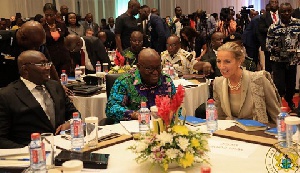 President Akufo-Addo, Dr. Muhamudu Bawumia and the UK Minister of State for Africa, Harriet Baldwin
President Akufo-Addo, Dr. Muhamudu Bawumia and the UK Minister of State for Africa, Harriet Baldwin
President Akufo-Addo says the New Patriotic Party (NPP) and government would have no excuse to give if they fail to develop the country.
He said, “Ghana has good human capital, and our economy has great possibilities for accelerated growth and job creation.
The president indicated that “in recent years, admittedly, our economy has not done so well, and we have not been successful in improving appreciably the living standards of our people.”
Speaking at the UK-Ghana Investment Summit in Accra yesterday, he disclosed that “for a country like Ghana that has abundance of valuable natural resources, we have no excuse for not being able to use the blessings bestowed on us by the Almighty to bring progress and prosperity to the citizenry.”
That, he said, was part of reasons why Ghanaians voted for him and his party in December 2016 with clear marching orders.
“They were dissatisfied with their lot, and demanded the charting of a new path – a path that offers fair opportunity for all, where hard work, enterprise and creativity are rewarded, where there is an abundance of decent jobs with good pay, where there is a dignified retirement for the elderly, and where there is a social safety net for the vulnerable and disadvantaged,” he emphasised.
He disclosed that “on assumption of office, the first order of business of my government has been the implementation of economic policies to promote a business-friendly environment.”
“This government believes that growing the economy the right way, with a level playing field, is the best option for our country’s future, and that is what we are trying to do,” he told the audience.
Measures
“Within 21 months that I have been at the helm of affairs of the country, we have worked very hard to put the Ghanaian economy back on track, and the economic fundamentals, which for a long time were off-target, are now beginning to point in the right direction.”
Apart from that, he revealed that “a growth rate of 8.5% in 2017, likely to be repeated this year, up from 3.6% in 2016, the attainment of single digit inflation, a relatively stable currency despite the challenges of a strong dollar, reduction of lending rates, and the implementation of policies such as the paperless port system, e-business registration system, and the mobile interoperability system, which are helping to formalise the Ghanaian economy, lowering the cost of doing business and cutting down excessive bureaucracy, are examples of some of the steps being taken to revive the Ghanaian economy.”
“In addition to these, a number of taxes, which were strangling businesses and business owners, have either been abolished or reduced. Utility tariffs, i.e. of electricity and water, have also seen significant reductions, with businesses and industry enjoying tariff reductions of as high as 30% and 10%,” he told the gathering.
“We do all of this because there is a government in place that believes in the primacy of the private sector, and is working to enhance the prospects of a win-win environment for both private sector and country; an environment where companies cannot just survive, but actually thrive. There is a government in place that believes in market principles and welcomes investors who want to work to promote the same and help build our economy. And above all, there is a government in place that is genuinely looking out for the interests of its people.”
He urged the UK investors to take advantage of the growing business-friendly climate in the country to invest in Ghana to boost government’s flagship policies of ‘One District, One Factory,” “One Village, One Dam,’ and “Planting for Food and Jobs.”